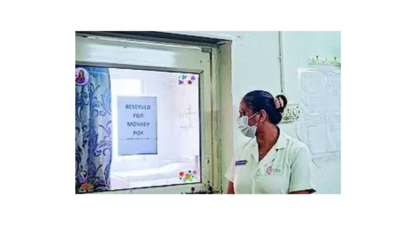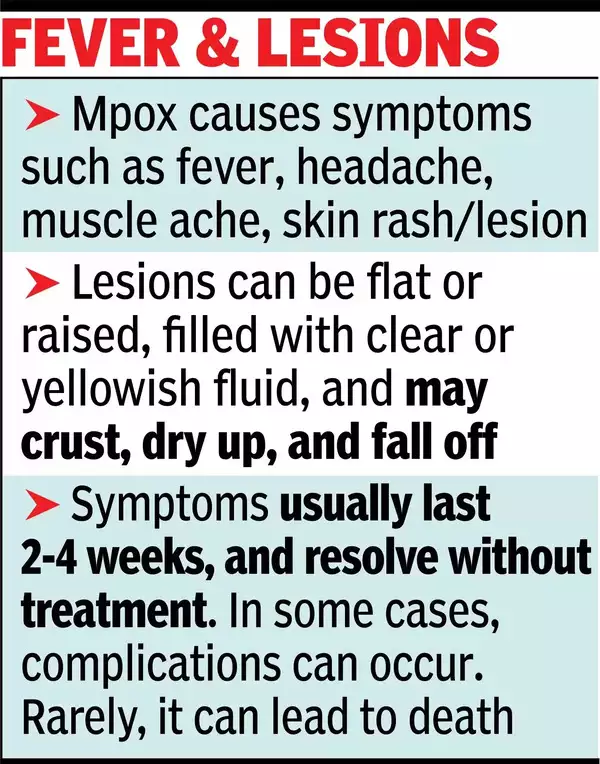- News
- India News
- Kerala Dubai returnee is India's first Mpox patient with fast-spreading strain
Trending
Kerala Dubai returnee is India's first Mpox patient with fast-spreading strain

Mpox
NEW DELHI: India has reported its first case of Monkeypox (Mpox) caused by the fast-spreading Clade 1B strain of the virus. Last month, WHO declared Mpox a disease of international concern.
Health ministry sources said the strain has been found in a patient from Kerala who returned from Dubai recently. "The patient is stable, and contact tracing to identify any potential spread of the disease is being carried out," a source in the ministry said. "There is no indication of any widespread risk to the public at this time."
"There is no indication of any widespread risk to the public at this time."
"Unlike influenza or Covid-19, Mpox is not airborne," a ministry official said. "It spreads mostly through unprotected close physical contact. Sexual transmission is also an important mode of spread. In addition to that, it can spread from contact with infected material from blisters and scabs of a patient."

The infected fluid from blisters and scabs of a patient can contaminate material such as bedding," said a health ministry official. "Therefore, maintaining hygiene is important. Another mode of transmission is through caregivers who are not using personal protective measures."
Mpox cases have been reported in India earlier as well. From 2022 to 2024, officials said, more than 30 cases of the disease have been reported from various parts of the country, mostly involving people with a history of travel to African countries, where the disease is widespread.
"All mpox cases reported earlier were caused by the Clade II strain of the virus. This one from Kerala is the first case where the infection has been caused by Clade 1B which is known to be more transmissible and has a higher fatality rate as compared to Clade II," an official said.
Recently, a case of Mpox caused by the Clade II strain of the virus was detected in a 26-year-old resident of Haryana's Hisar. He was isolated at Lok Nayak Hospital for a few days and discharged. A health ministry source said public health measures, including contact tracing and monitoring, are actively in place to ensure the situation is contained.
Health ministry sources said the strain has been found in a patient from Kerala who returned from Dubai recently. "The patient is stable, and contact tracing to identify any potential spread of the disease is being carried out," a source in the ministry said.

"Unlike influenza or Covid-19, Mpox is not airborne," a ministry official said. "It spreads mostly through unprotected close physical contact. Sexual transmission is also an important mode of spread. In addition to that, it can spread from contact with infected material from blisters and scabs of a patient."

Mpox not new to India, over 30 cases reported from 2022 to 2024: Officials
The infected fluid from blisters and scabs of a patient can contaminate material such as bedding," said a health ministry official. "Therefore, maintaining hygiene is important. Another mode of transmission is through caregivers who are not using personal protective measures."
Mpox cases have been reported in India earlier as well. From 2022 to 2024, officials said, more than 30 cases of the disease have been reported from various parts of the country, mostly involving people with a history of travel to African countries, where the disease is widespread.
"All mpox cases reported earlier were caused by the Clade II strain of the virus. This one from Kerala is the first case where the infection has been caused by Clade 1B which is known to be more transmissible and has a higher fatality rate as compared to Clade II," an official said.
Recently, a case of Mpox caused by the Clade II strain of the virus was detected in a 26-year-old resident of Haryana's Hisar. He was isolated at Lok Nayak Hospital for a few days and discharged. A health ministry source said public health measures, including contact tracing and monitoring, are actively in place to ensure the situation is contained.
End of Article
FOLLOW US ON SOCIAL MEDIA










